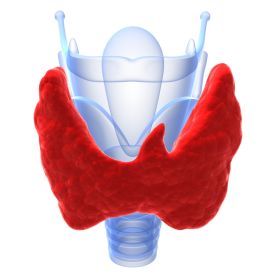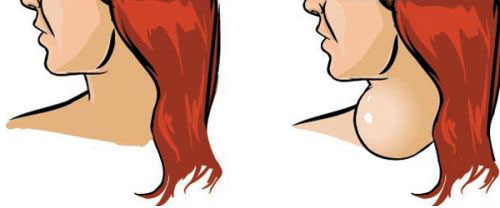Effects PCOS Has On Your Thyroid
PCOS or PCOD (Polycystic Ovarian Syndrome and Polycystic Ovary Disorder,  respectively) is a complex condition that can be difficult to diagnose. It’s sometimes mistaken for a thyroid disorder, as some PCOS and thyroid symptoms are similar or they might occur together. In addition, the abnormalities in thyroid hormones can play a major role in PCOS, which is also often influenced by a condition called Insulin Resistance. If you suspect you have either a thyroid disorder or PCOS or both, consult a health-care professional to ensure a proper diagnosis.4 It is possible that lifestyle changes, such as better diet, exercise, and pharmaceutical or nutritional supplementation, can correct many of the difficult symptoms you have with both disorders.
respectively) is a complex condition that can be difficult to diagnose. It’s sometimes mistaken for a thyroid disorder, as some PCOS and thyroid symptoms are similar or they might occur together. In addition, the abnormalities in thyroid hormones can play a major role in PCOS, which is also often influenced by a condition called Insulin Resistance. If you suspect you have either a thyroid disorder or PCOS or both, consult a health-care professional to ensure a proper diagnosis.4 It is possible that lifestyle changes, such as better diet, exercise, and pharmaceutical or nutritional supplementation, can correct many of the difficult symptoms you have with both disorders.
+ Click here to learn about the all natural PCOS 5-Element Solution
+ Click here to read more articles about PCOS and Hormones
Causes
What is PCOS?
Polycystic Ovarian Syndrome (PCOS) is a hormonal imbalance that is implicated in a number of health issues. Because this condition is associated with the female reproductive system it might be baffling to learn that PCOS can also interfere with the  thyroid. Since hormones have access to all areas of the body it makes sense that an imbalance in one set of hormones can lead to an imbalance in another. Because thyroid disorders are often caused by imbalances of the thyroid hormones, it naturally follows that Polycystic Ovarian Syndrome can actually cause you to be more susceptible to thyroid disorders.
thyroid. Since hormones have access to all areas of the body it makes sense that an imbalance in one set of hormones can lead to an imbalance in another. Because thyroid disorders are often caused by imbalances of the thyroid hormones, it naturally follows that Polycystic Ovarian Syndrome can actually cause you to be more susceptible to thyroid disorders.
Polycystic Ovarian Syndrome (PCOS) can occur when the levels of androgens (male hormones) are too high in the body, although this is only one possible factor because some women with PCOS have normal testosterone levels. Mostly made up of testosterone, these androgens can wreak havoc on the female reproductive system, because they interfere with the natural levels of estrogen and progesterone. In doing so, they cause major changes in normal reproductive functions. These changes are reflected in the symptoms this condition can cause, many of which are painful, embarrassing, and difficult to cope with, including but not limited to:
- Infertility: Polycystic Ovarian Syndrome (PCOS) is one of the most common causes of female infertility, which is often the way women with this disease find out about their condition.
- Polycystic Ovaries: Often compared to the image of a “string of pearls,” polycystic ovaries are a common symptom of Polycystic Ovarian Syndrome (PCOS) but, despite the fact the condition is named after them, are not requisite for a positive diagnosis.
- Hirsutism: Caused by excess levels of testosterone, this excessive growth of hair is a source of embarrassment and stress to many women. Oftentimes, hirsutism results in hair growth in unnatural and visible locations, such as the face, chest, or back.
- Hair Loss: Often taking the form of male pattern baldness, hair loss or even thinning of the hair is an emotional and difficult symptom for women.
- Weight Gain and Obesity: Difficult for women to cope with, especially considering modern pressures to maintain a thin figure, weight gain and obesity are common symptoms. In addition to gaining weight, many women have an extremely difficult time losing it.
- Sporadic or Missing Menstrual Periods: This symptom can contribute to infertility and is caused by the interference of testosterone with the regular cycle of the female reproductive system.
- Anovulation: Without ovulation, conception cannot be accomplished. This, then, is one of the major symptoms that leads to infertility and, like missing menstrual periods, is caused by the interference of testosterone. With high levels of testosterone, estrogen and progesterone cannot keep the female reproductive system on track.
- Skin Conditions: Women with Polycystic Ovarian Syndrome (PCOS) often suffer through the embarrassment of having acne, skin tags, dry skin, dandruff, and other skin conditions. Included in this list of symptoms is acanthosis nigricans, which results in thick, dark patches of skin.
- High Cholesterol and High Blood Pressure: These symptoms are extremely worrisome for women with Polycystic Ovarian Syndrome (PCOS) puting them at a greater risk for heart disease, heart attack, or stroke.
- Sleep Apnea: This symptom makes every day harder, as women who cannot get a good night’s rest are often exhausted.
Symptoms
What PCOS Looks Like
How Are PCOS and Thyroid Disorders Connected?
It’s known that if you’re a woman who has Polycystic Ovarian Syndrome (PCOS) you’re at a greater risk for developing a thyroid disorder.

However, the exact link between these two health issues is not entirely clear. In addition to sharing a root cause (a hormonal imbalance), these two conditions share a few symptoms, which makes monitoring thyroid health imperative for women with Polycystic Ovarian Syndrome (PCOS). These shared symptoms are missing periods and abnormal hair growth, most often in the form of hair loss, but can also include.3
- Skin issues
- Decreased libido
- Heavy menstrual bleeding
- A lack of ovulation (also known as anovulation, which can lead to infertility)
- Weight gain
The good news is that thyroid disorders are much easier to diagnose than Polycystic Ovarian Syndrome (PCOS), and there is more research about these disorders to guide physicians when making a diagnosis. Additionally, the treatment options are broader. However, if a thyroid disorder is found in conjunction with Polycystic Ovarian Syndrome, it will be necessary for your doctor to treat both issues to keep them under control.
Treatment Options
Hyperthyroidism vs Hypothyroidism
Before we discuss treatments, it’s important to learn the distinction between two types of thyroid disorders – Hyperthyroidism and Hypothyroidism.2
 First, let’s look at hyperthyroidism. This strain of thyroid disorder occurs when the thyroid produces too many hormones, resulting in, essentially, an overactive thyroid.
First, let’s look at hyperthyroidism. This strain of thyroid disorder occurs when the thyroid produces too many hormones, resulting in, essentially, an overactive thyroid.
Because the thyroid is responsible for the metabolism and regulation of many of the body’s systems, including the rates at which the cardiovascular and respiratory systems run, it can produce a great deal of stress for your body when it’s overactive. Hyperthyroid problems that women could face include any of the following:
- An abnormally large thyroid gland
- Missing or irregular menstrual periods
- Weight loss accompanied by an increase in appetite
- Sweating excessively
- An intolerance of heat
- Hair loss
- Eyeball protrusion
- Insomnia
- Increased heart rate
- Increased blood pressure
Treatment for this condition includes a variety of medications that reduce the production of thyroid hormones, radioactive iodine (administered as a pill, rather than actual radiation treatments), and surgery.
Hypothyroidism is the exact opposite of the preceding condition. Hypothyroidism occurs when there is a lack of thyroid hormones and the thyroid itself decreases in function. This can also result in several uncomfortable symptoms that are difficult to cope with, including:
- Dry skin
- Decreased libido
- Constipation
- Heavy menstrual bleeding
- Lethargy
- An intolerance of cold
- A lack of ovulation (also known as anovulation, which can lead to infertility)
- Weight gain
- Decreased appetite
Treatment for hypothyroidism often entails hormone replacement therapy, which helps get thyroid hormones to their proper levels. In fact, according to one endocrine research study, “In obese PCOS patients with primary hypothyroidism, Metformin (a diabetes drug) results in a significant fall and sometimes normalization of TSH, without causing any reciprocal changes in other thyroid function parameters.”6 Perhaps not ironically, Metformin is often prescribed to PCOS patients.
In both thyroid disorder though, a balanced diet and regular exercise are important to maintaining a high level of overall health, which will help your body fight these conditions and regain its proper hormonal levels.
How Do You Know if You Have a Thyroid Disorder?
Oftentimes patients who present with symptoms that could be attributed to Polycystic Ovarian Syndrome (PCOS) or a thyroid disorder undergo a blood test to determine the levels of thyroid hormones in the system.5 There are three main hormones that doctors will screen for in your blood, which are Thyroid Stimulating Hormone, T3, and T4.1 These three hormones are not the only thyroid hormones in your system, but they work closely together to ensure optimal health. Furthermore, they’re the best to test when analyzing whether or not you have a thyroid disorder.
Although Polycystic Ovarian Syndrome (PCOS) can be easy to blame for thyroid disorders in women with both conditions, it is important for doctors and patients to remember that Polycystic Ovarian Syndrome (PCOS) is not the only cause of a thyroid problem. In fact, abnormal levels of thyroid hormones can be caused by a number of other factors, such as Grave’s disease, Hashimoto’s disease, or thyroid cancer. Until the exact cause has been determined, or other possible causes have been positively ruled out, your testing shouldn’t be stopped.
Natural Therapies
Can You Get Rid of PCOS by Treating Thyroid Disorders?
Unfortunately, treating Polycystic Ovarian Syndrome (PCOS) is much more difficult than treating a thyroid disorder and, even if the two are known to be related in one way or another, treating one cannot resolve the other. However, Polycystic Ovarian Syndrome (PCOS) can be treated without medication and in a way that will promote overall health, benefiting any attempts to cure thyroid a disorder. The reason is an influencing factor of PCOS, which is Insulin Resistance. IR, as it’s also called, is a condition in which your body’s cells become resistant to the effects of insulin, which increases the risk of type 2 diabetes, cardiovascular disease and, of course, PCOS. Insulin is very important because it’s responsible for regulating the cells of your body by controlling the levels of carbohydrates (starches and sugar), fats (lipids) and proteins. When they get ‘out of control’, you become ‘imbalanced’. There are steps, however, to help correct Insulin Resistance.
Successfully managing Polycystic Ovarian Syndrome (PCOS) entails a complete system with five elements:
- Eating a balanced diet. Again, at the heart of this disorder often lies Insulin Resistance, and as such, you should eat foods that minimize the amount of insulin released by your body. Stay away from sugary foods and those made of simple carbohydrates. Instead, choose foods high in fiber and low on the glycemic index.
- Getting plenty of exercise. No matter what your physical limitations, getting your body moving is important in fighting the weight gain, high cholesterol, and heart disease that Polycystic Ovarian Syndrome can cause. This can mean anything from walking around the block to taking an hour out of each day to go to the gym, as long as you are doing what you can. It’s important over time to increase the rate and difficulty of your exercise routines according to your physical capabilities.
- Specially targeted formulas of vitamins, minerals, and botanicals, these can help our body fight back.
- Enlist emotional support. Comfort and guidance are crucial in coping with Polycystic Ovarian Syndrome, and reaching out to other women who have fought the condition can be a healing and motivating experience. Through support groups and networks, you can find others who have undergone the same struggles and get help overcoming your own challenges with this condition.
- Getting smart. Actually using a resource like this website to learn everything you can about Polycystic Ovarian Syndrome (PCOS) and Insulin Resistance (IR) and their symptoms will enable and empower you to informed choices about your situation and how to best your health and wellbeing.
Polycystic Ovarian Syndrome and thyroid disorders are conditions that should be taken very seriously by both women and their doctors. Although the link between these two conditions has yet to be solidified, the threat is there and all women should be aware of it. Remember too, if you’d like to learn more about the holistic approach to PCOS, Insulite Health is here. Be sure to explore our website or talk to one of our experts, at no cost, who can offer nutrition, exercise and nutritional supplement information to help you fight PCOS.
Next Steps
- Take the PCOS Quiz! Get your score and assess your hormone health risks.
- Join our Facebook Sisterhood Group Pose your questions to this group of like-minded women. Get the answers to your questions and the support you need.
- Checkout the Hormone Reset. Guided Practices to eliminate anxiety, lose weight and boost energy.
We are committed to helping women reverse their symptoms of hormone imbalance – a major cause of excess weight gain, adult acne, unwanted facial hair, depression, anxiety, and heartbreaking female infertility.
©Insulite Health empowers women with hormone imbalance to transform their lives through a process of healing with the Natural Hormone Solution –a complete solution for helping women reverse the symptoms hormone imbalance..


